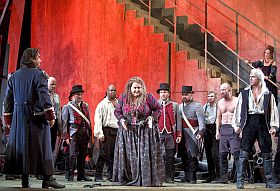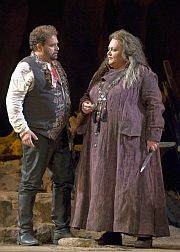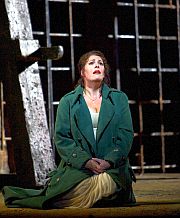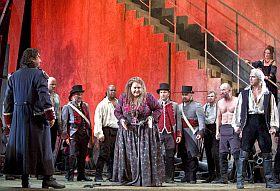
(Azucena), and Dmitri Hvorostovsky
(Count di Luna)
Photos by Cory Weaver
If the San Francisco Opera’s gala opening-night audience was prepared to settle in and be patient on Friday, they were quickly disabused of that notion. As a front drop of swarming Goya-esque faces flew up to reveal a towering palace wall and ominously long flight of stairs (by set designer Charles Edwards), this Trovatore quickly seized attention. Burak Bilgili spun out Capt. Ferrando’s tale of gypsy bewitchings, fiery deaths, and a miraculously spared child with gripping urgency. A chorus of soldiers expressed their alarm in tense unison. Most of all, the orchestra supplied a powerful undertow, rhythmically supple, by turns yearning and pungent, everywhere surgingly alive.
The best and biggest news of what turned out to be a night of mixed results was Nicola Luisotti’s official coming-out party as the third music director, after Sir John Pritchard and Donald Runnicles, in the company’s 87-year history. From the aching string sighs that accompanied the first act aria of Leonora (Sondra Radvanovsky, in a triumphant company debut) to the furnace-blasts of brass in the "Anvil Chorus" to the lonely but insistent bassoon notes that became a fateful pulse in the last act, perfectly judged details were woven into a purposeful whole. Even the occasional divergence of singer and orchestra only served to underscore the overall keenness and subtlety of communication between the stage and the pit.

Azucena (Stephanie Blythe)
Take, to choose just one of many instances, the Act 2 exchange between Azucena (a formidable and impressive Stephanie Blythe) and the opera’s eponymous troubadour, Manrico (an impassioned, if wayward, Marco Berti). As the stream of feelings flowed through a guilt-ridden mother and the man she raised as her own son (after incinerating her own), the music tracked them with a revealing surety. Dynamics, phrasing, even tightly coiled silences had an uncanny, intuitive rightness. Blythe's Azucena came across as a complex woman both sinned against and sinning, at once righteous and wheedling, determined and doomed. Berti punched out a stirring declaration in "Mal reggendo all’ aspro assalto" (Unable to withstand my bitter assault). But he was more moving and more real in his fleeting puzzlement at sparing his rival’s life in a duel.
Radvanovsky's Splendid S.F. Opera Debut

Excerpts from a preview performance of
SF Opera's 2009 Il Trovatore
While this may not have been a Trovatore for the ages, it did signal a brightly promising new musical era for San Francisco Opera. With Luisotti as music director, audiences can anticipate what Kerman envisioned in his book Opera As Drama. "Like poetry," he wrote, "music can reveal the quality of action, and thus determine dramatic form in the most serious sense."

